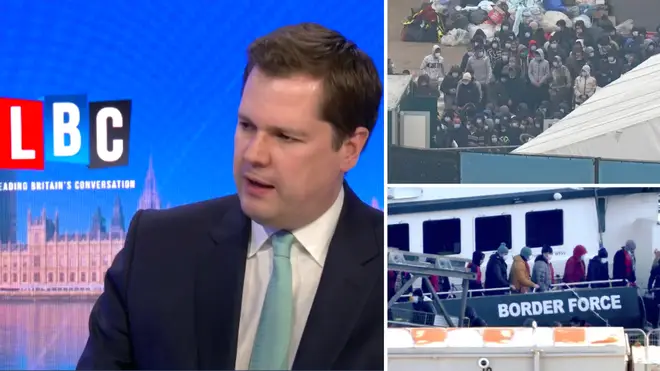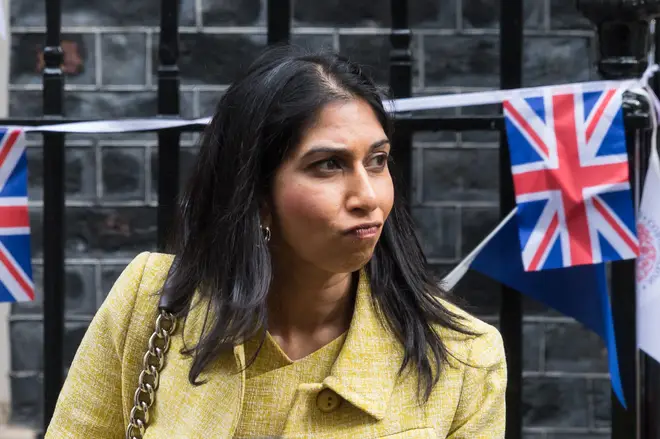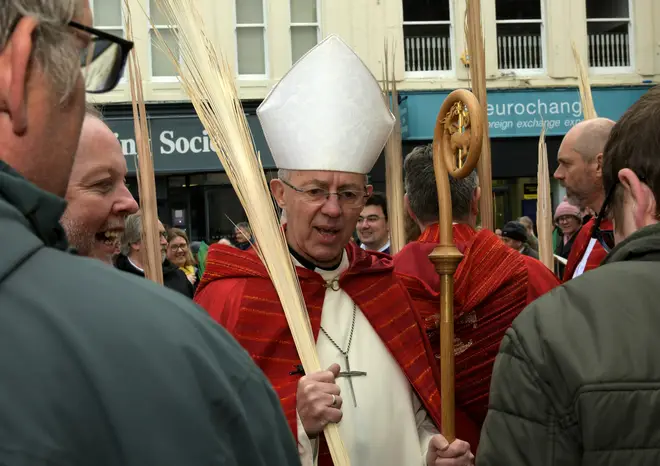
Paul Brand 10am - 12pm
10 May 2023, 18:57 | Updated: 10 May 2023, 19:00

Migrants crossing the English channel "predominantly don’t speak English, are lower-skilled people" and come from countries "that are quite different to our own", Robert Jenrick has told LBC.
Speaking on LBC's Tonight with Andrew Marr after the government's Illegal Migration Bill was slammed in the House of Lords, Mr Jenrick - the immigration minister - said it is "fundamental" that business models of people smugglers are broken.
"I fundamentally believe you will not do that unless you make it clear that if you come here illegally on a small boat you won't find a route to a life in the UK," he said.
"You’ll either be returned home to a safe country like Albania or a third country like Rwanda.
“That is ultimately the only way to imbue our system with the deterrents that is necessary to break the model."

Robert Jenrick: That anyone coming to the UK on a small boat won’t find a life in the UK
Asked if his rhetoric on immigration is "dehumanising" towards asylum seekers, Mr Jenrick said there is a need for "an honest debate" and that "people coming across the channel in small boats are breaking the law".
He told LBC: "They’re breaking into our country…they often originate from places of great danger but they are coming from France.
“The overwhelming majority are young men, who are fit and able - they’re in France…they’re choosing to come to the UK.
“They’re also predominantly people who are not from liberal democracies, with the same standards of protection of minorities.
“They are people who will place a great burden on the British state.
“The studies I’ve seen suggest that if you take people who predominantly don’t speak English, are lower-skilled people, from countries that are quite different to our own, then this will be a huge effort by the British state to support and integrate them."
Mr Jenrick added that the burden of migrants crossing the channel will "predominantly fall upon on the poorest in our society" and suggested they could be left without social housing as a result.


It comes after the Home Secretary Suella Bravernman and Justice Secretary Alex Chalk urged members of the House of Lords to back their Illegal Migrant Bill, saying it is the "will of the people".
But the Archbishop of Canterbury Justin Welby slammed the bill, saying it "has no sense at all of the long term and the global nature of the challenge that the world faces".
Speaking in the House of Lords, Justin Welby argued against the flagship legislation aimed at ensuring people who arrive in the UK in small boats would be detained and promptly removed, either to their home country or a third country such as Rwanda.
He said: "It ignores the reality that global migration must be engaged with at source as well as in the Channel as if we as a country were unrelated to the rest of the world."
Read More: Archbishop of Canterbury Justin Welby slams controversial migrants bill as 'morally unacceptable'
Mr Jenrick said the government "will listen carefully to all views expressed in the Lords" but said the "British public expect us to take action".
"They can see the unfairness of what’s happening in the channel, which is that mostly young men in a place of safety - France, with a fully functioning asylum system - are getting into small boats, fuelling the people smugglers and breaking into our country in flagrant breach of our laws," Mr Jenrick said.
“People expect us to take action - any country would do and we should do as well.”

Robert Jenrick: Tories will do 'everything in their power' to tackle the immigration crisis
The House of Lords sat earlier from 11am on Wednesday to consider the Illegal Migration Bill at second reading after it passed the Commons, with almost 90 speakers including the archbishop listed.
The Bill includes provisions that would limit the ability of the European Court of Human Rights (ECHR) to prevent the deportation of asylum seekers.
April was the busiest period for small boats so far this year, with 1,850 of this year's 5,652 arrivals making the journey last month.